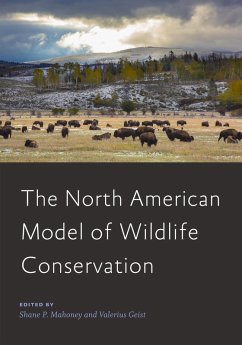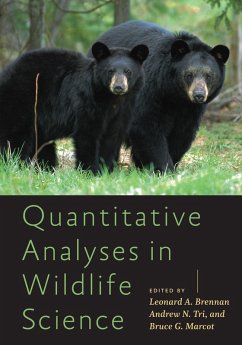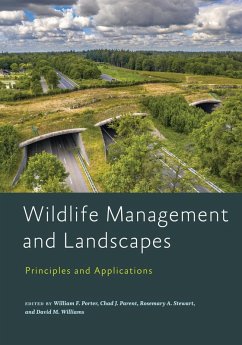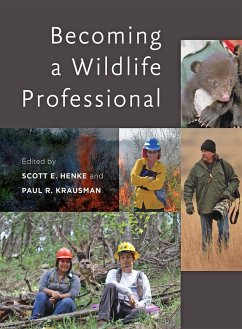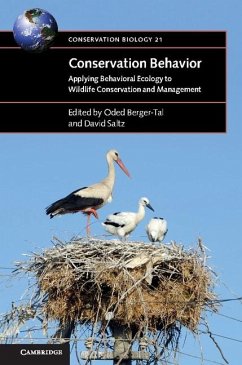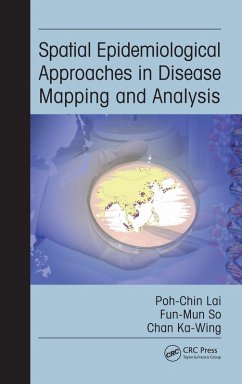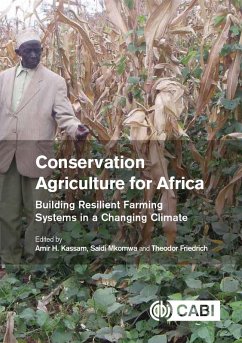
Renewable Energy and Wildlife Conservation (eBook, ePUB)
Versandkostenfrei!
Sofort per Download lieferbar
39,95 €
inkl. MwSt.
Weitere Ausgaben:

PAYBACK Punkte
20 °P sammeln!
Brings together disparate conversations about wildlife conservation and renewable energy, suggesting ways these two critical fields can work hand in hand.Renewable energy is often termed simply "e;green energy,"e; but its effects on wildlife and other forms of biodiversity can be quite complex. While capturing renewable resources like wind, solar, and energy from biomass can require more land than fossil fuel production, potentially displacing wildlife habitat, renewable energy infrastructure can also create habitat and promote species health when thoughtfully implemented.The authors o...
Brings together disparate conversations about wildlife conservation and renewable energy, suggesting ways these two critical fields can work hand in hand.Renewable energy is often termed simply "e;green energy,"e; but its effects on wildlife and other forms of biodiversity can be quite complex. While capturing renewable resources like wind, solar, and energy from biomass can require more land than fossil fuel production, potentially displacing wildlife habitat, renewable energy infrastructure can also create habitat and promote species health when thoughtfully implemented.The authors of Renewable Energy and Wildlife Conservation argue that in order to achieve a balanced plan for addressing these two crucially important sustainability issues, our actions at the nexus of these fields must be directed by current scientific information related to the ecological effects of renewable energy production. Synthesizing an extensive, rapidly growing base of research and insights from practitioners into a single, comprehensive resource, contributors to this volume* describe processes to generate renewable energy, focusing on the Big Four renewables-wind, bioenergy, solar energy, and hydroelectric power* review the documented effects of renewable energy production on wildlife and wildlife habitats* consider current and future policy directives, suggesting ways industrial-scale renewables production can be developed to minimize harm to wildlife populations* explain recent advances in renewable power technologies* identify urgent research needs at the intersection of renewables and wildlife conservationRelevant to policy makers and industry professionals-many of whom believe renewables are the best path forward as the world seeks to meet its expanding energy needs-and wildlife conservationists-many of whom are alarmed at the rate of renewables-related habitat conversion-this detailed book culminates with a chapter underscoring emerging opportunities in renewable energy ecology.Contributors: Edward B. Arnett, Brian B. Boroski, Regan Dohm, David Drake, Sarah R. Fritts, Rachel Greene, Steven M. Grodsky, Amanda M. Hale, Cris D. Hein, Rebecca R. Hernandez, Jessica A. Homyack, Henriette I. Jager, Nicole M. Korfanta, James A. Martin, Christopher E. Moorman, Clint Otto, Christine A. Ribic, Susan P. Rupp, Jake Verschuyl, Lindsay M. Wickman, T. Bently Wigley, Victoria H. Zero
Dieser Download kann aus rechtlichen Gründen nur mit Rechnungsadresse in A, B, BG, CY, CZ, D, DK, EW, E, FIN, F, GR, HR, H, IRL, I, LT, L, LR, M, NL, PL, P, R, S, SLO, SK ausgeliefert werden.




